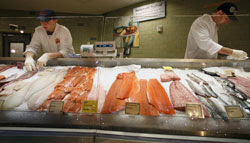 How can we harness the power of seafood buyers to save our oceans? It's time for sustainable seafood 2.0
How can we harness the power of seafood buyers to save our oceans? It's time for sustainable seafood 2.0After a decade of effort, the sustainable seafood movement matters. To use a business school term, value has been created for sustainable seafood. Now, most seafood businesses want to capture that value. "Sustainable" products are becomming more common and sustainability claims are often used to help sell seafood.
But it's an interesting success. There is little evidence for higher prices being paid for sustainable seafood, and there is very little evidence that seafood sales or prices have been affected by boycotts or "don't buy" advice.
The consumer campaigns on sustainable seafood matter, but not in the way most people think. Most so-called selective buying is not selective enough to reward the best seafood and punish the least sustainable. Complexities of the global seafood marketplace make that essentially impossible.
BUT, seafood businesses are smart and they see a chance to boost market share for products that gain public favor. So many businesses are launching their own efforts to brand their products as "sustainable" and attract customer loyalty.
Since seafood businesses are on board with the concept of sustainable seafood, I humbly suggest that it's time for sustainable seafood 2.0
And here's my suggestion of what it might be:
Consumers can support sustainability by choosing a seafood seller to trust, and supporting their chosen seafood seller in the work of advancing seafood sustainability.
The trusted seafood authority might be a seafood brand. Perhaps a particular sustainability certification. But more likely, customers will place their trust in a particular seafood seller (market or restaurant) and trust that business to do the work for them. Customers are used to trusting a store or restaurant for freshness and flavor, and sustainability is natural partner of quality and reliability.
How can individuals matter? Choose carefully your trusted seafood seller, and then make friends with the people who sell you the fish. Try to get in touch with the people who choose the seafood that is sold, and offer them your support (first) and your opinions (second). The people who choose the seafood for sale are your friends and allies in seeking sustainability.
Be aware that there are not a lot of sustainable seafood products that are also high-demand preferred products. Most of the top selling seafood items don't pass sustainability criteria, so asking your seafood seller to drop them is asking them to harm their business. That's a tough thing to ask for a business.
Finally, help support the now ongoing efforts by some seafood businesses to improve the sustainability of seafood products that they sell. Major seafood buyers are now engaged in fishery improvement projects, trying to reform unsustainble fisheries. This is the holy grail of sustainable seafood, actual reform of unsustainable fisheries.
How does this work? Rather than expecting the invisible hand of the marketplace will fix fisheries, some businesses are exerting a real hand and trying to fix fisheries directly. And...you're going to be surprised...Wal-mart is one of them. There is not yet a list of such businesses, but with enough demand a list might be developed.
And, if you want to know more about this process, go to www.oceanconservancy.org/seafood since OC is a leader in this effort. Tweet
3 comments:
This is great. You know, I'd like to see some sort of sustainabilty certification or seal on products... like we used to have markings that said "Dolphin safe tuna" on those cans that were. I was aware of (and pleasantly surprised by) Walmart's efforts.
I think sustainable seafood 2.0 is a well balanced approach. Here I'd been thinking that you hadn't been thinking of the consumers part in all this, but now I am wondering if that just didn't get lost in your attempt to get across the importance of involving the fisheries and related businesses.
I totally agree. The problem is, what happens if your 'trusted' seller starts making uninformed decisions - often accidentally (never attribute to malice what can be explained by stupidity).
I would argue this is exactly what Craig et al. over at DSN are doing with Trader Joe's. It's important to make your choices and support your sustainable supplier, but, it's equally important to remember that business is business, and your supplier will respond to demand.
I think there's a half-way point here, and it's going to take actual organization of people (as people are power) to really reward (and punish, or at least nudge) suppliers based on their dedication to sustainability.
Perhaps a 'reward business X' challenge is in order...
Thanks Dorid, there is a sustainability certification that's trying to gain traction, the Marine Stewardship Council. I support MSC.
Thanks JEB. Regarding the DSN/Trader Joe's, I would opt for a more productive engagement with Trader Joe's. And you're repeating a mistake in making simplistic assumptions absout the seafood supply chain that are not, in fact accurate. It's very difficult to reward or punish seafood sellers appropriately because of supply chain complexity, labeling that doesn't tell the full story, etc. If you try to reward or punish, you're likely to do so unselectively and that won't help your cause, it'll just make businesses hate the issue of seafood sustainability because they can't predict the outcome of their efforts.
Post a Comment